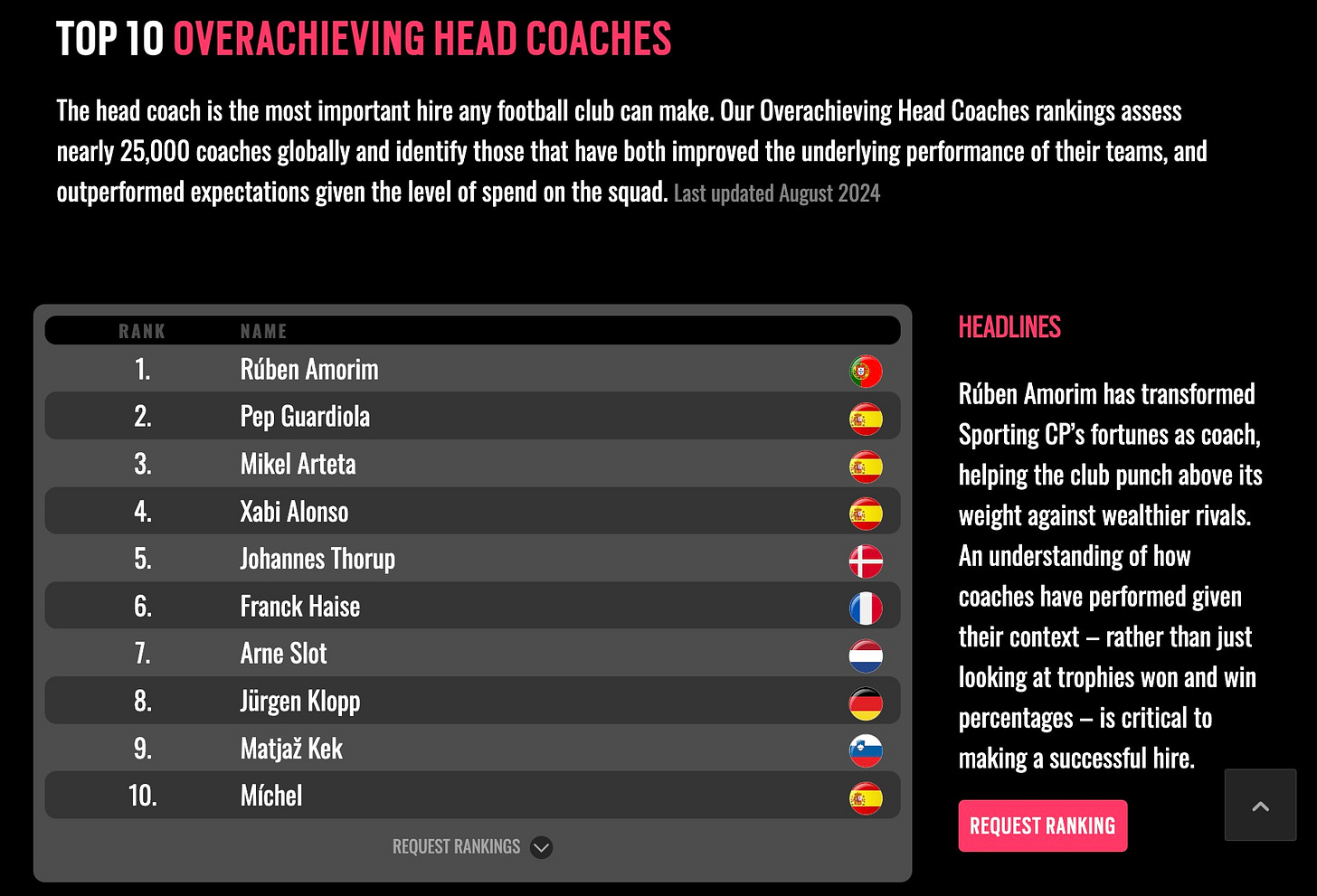Ruben Amorin starts work at Man Utd as football's most overachieving coach
The Portuguese manager was recently identified as the best in the world when considering the resources he had at Sporting Lisbon and the results he delivered.
Ruben Amorim arrived in England on Monday to start work as Manchester United’s new head coach. The 39-year-old was greeted at the club’s training ground by the club’s CEO Omar Berrada (below), and has spent the week getting to know the United players who aren’t away on international duty.
United fans will be hoping that, at last, their club has found a person who can finally take them back being serial winners, something that hasn’t been the case since Sir Alex Ferguson retired in 2013.
Amorin has won five trophies with Sporting since getting that job in March 2020, including two Primeira Liga titles. His final domestic match in charge there was last Sunday’s 4-2 away win at Braga, Sporting’s 11th win in 11 league matches this season.
His final European match was five days earlier as Sporting thrashed Manchester City 4-1 in the Champions League, taking them to second place in the 36-team CL table behind only Liverpool.
In a guest post today, Omar Chaudhuri, the chief intelligence officer of the sports intelligence agency, Twenty First Group, explains why Amorin is so special.
The Twenty First Group help sporting organisations, including football clubs, with their strategic decision-making based on data.
By Omar Chaudhuri
What Rúben Amorim has achieved at Sporting CP is remarkable. Most fans can appreciate at a superficial level that winning two league titles with Portugal’s third-biggest club is worthy of recognition, but our analysis of his underlying performance meant we placed him top of our Overachieving Head Coach rankings during the off-season.
These rankings account for long-term impact on performance, and overachievement relative to budget.
The former looks at a team’s underlying performance, based on our World Super League which ranks more than 7,000 teams in global football in one ‘league table’, and how that changes over the course of a manager’s tenure. (The same applies for international coaches, based on a ranking of national teams).
The latter compares this ranking to what we would expect given the level of spend on the players in the squad, and for national team coaches the intrinsic quality of players at their disposal.
Amorim took over Sporting with the club well outside the world’s top 50 teams, and leaves them ranked 8th in the world.
In our 16 years worth of rankings, no team outside the “Big 5” leagues has come close to Sporting’s level today. What’s more, they would be favourites against the likes of PSG, Chelsea and Manchester United, despite spending 80-90% less on players, and more generally have had a win percentage that is 19 points higher than we would expect given spend.
This places Amorim above even the likes of Pep Guardiola, Mikel Arteta and Jurgen Klopp in our rankings, and clearly marks him out as one of Europe’s top coaches.
But this does not guarantee success at Manchester United; Erik Ten Hag took Ajax to a Champions League semi-final and into the top 15 of our World Super League with a wage bill 75% smaller than Manchester United’s, meaning there are parallels between his achievements and Amorim’s.
Indeed our research shows that one of the strongest predictors of a head coach’s success at a club is not necessarily related to the coach himself: a coach is twice as likely to fail if the club’s previous manager also failed, and vice versa for success. This points to the fact that the environment is just as important as the individual, and environments often set managers up to fail.
Manchester United’s new leadership team will know this, having had success in clubs and national teams that did everything they could to align their organisations around a common vision and strategy. Amorim’s CV is only strengthened by a deeper analysis of his performance, but he cannot be the plan in and of himself.
You can find Omar on Twitter @OmarChaudhuri
This piece is one of numerous articles on this site that is free to read for everyone. But the work of the Sportingintelligence Substack, not least investigative pieces on the smoke & mirrors of Man City’s legal battles, the true scale of match-fixing in England, the ‘Skyfall’ series on drugs in British cycling, part 1 of 5 here, match-fixing in tennis, and much else, is unsustainable without paid subscriber support. It’s $7 a month, or £5.39, which is less than the price of a pint. Try it and read everything. And if you’re not getting value for money, unsubscribe. Thanks!






